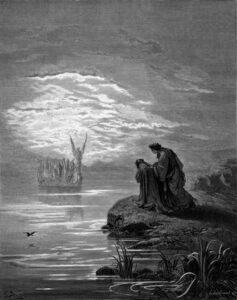In Purgatory 4 Dante comments on the nature of our sense of Time, which is partly related to the context of the Late Repentants – those who were distracted or started late on the Path to seeking deeper, and spiritual, Knowledge.
When any of our senses is aroused
to intensity of pleasure or of pain,
the soul gives itself up to that one sense,
oblivious to all its other powers.
This fact serves to refute the false belief
that in our bodies more than one soul burns.
And so it is that when we see or hear
something which wholly captivates the soul,
we easily can lose all sense of time.
The sense aware of time is different
from that which dominates all of the soul:
the first is free to roam, the other, bound.
This passage comes after the second encounter with a shade where the Pilgrim gets lost in the moment, and delayed on his metaphorical Journey and climb up the mountain of Purgatory.


